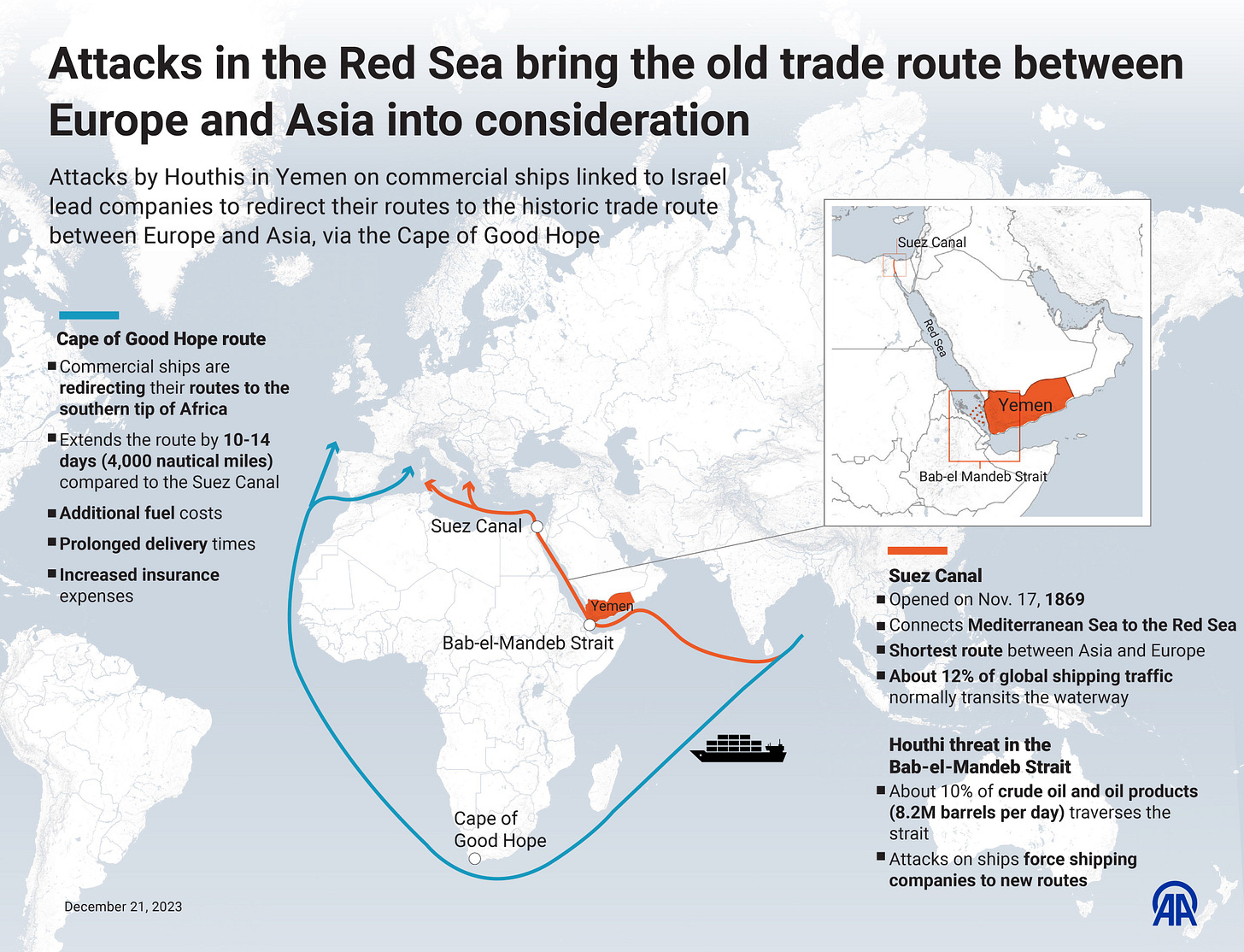What's going on in the Middle East?
The US is sowing chaos to hinder the transition to a multipolar order
From the very first days of Israel’s assault on Gaza, two things were clear: that it was going to be an unprecedented bloodshed; and that the war was almost inevitably going to spread to the rest of the Middle East. One hundred days later, both prognostics have been dramatically confirmed: the violence unleashed by Israel in Gaza has been so extreme that the country is now facing accusations of genocide; meanwhile, almost every day the news is filled with stories about bombs, air strikes, attacks and counterattacks happening all over the Middle East — in Iraq, Syria, Lebanon, Iran, Yemen.
The war in Gaza has effectively escalated into a wider regional war, albeit still a relatively low-intensity one for now. Given the wide variety of actors involved, one might struggle to make sense of what’s going on. But it’s actually not that complicated. What we are witnessing is effectively a confrontation between Israel and the US (and the latter’s client states) on one side, and an informal anti-Israeli and anti-Western coalition loosely led by Iran, commonly referred to as the Axis of Resistance (which in turn can count on a wide range of local “closet supporters”), on the other.
These two blocs have been engaged in tit-for-tat exchanges ever since the start of Israel’s attack on Gaza, including: daily clashes between Israel and the Iran-linked armed group Hezbollah along the Israeli-Lebanese border; Israeli air raids on Iran-linked groups in Syria, as well as on the airports in Damascus and Aleppo; the occasional missile fired from Yemen towards Israel (all of which were intercepted by either Israel or US forces in the region); and dozens of drone and rocket attacks on American bases in Syria and Iraq, to which the US retaliated by retaliated by carrying out increasingly aggressive strikes on Iran-linked targets in the two countries.
For a while, all the actors involved appeared to be carefully calibrating their actions in order to avoid the risk of escalation. But over the past month, events have, in fact, escalated — dramatically.
For one, Israel has been carrying out increasingly brazen strikes on high-level Axis of Resistance members: in the space of a few days, between late December and early January, Israel killed, in two targeted strikes, a senior member of Iran’s Revolutionary Guards, Sayyed Razi Mousavi, outside the Syrian capital Damascus, and Hamas’s deputy leader Saleh al-Arouri, in Beirut.
The day after al-Arouri’s killing, a devastating terrorist attack was carried out in Iran, near the grave of general Qassem Soleimani, on the anniversary on his death (in a targeted assassination carried out by the Trump administration). More than 100 people were killed. The Islamic State (ISIS) claimed responsibility for the attack, though Iran accused Israel of being involved (in the past Israel has provided support to ISIS-linked group in Syria).
Meanwhile, the situation has seriously deteriorated in southern Lebanon: so far, almost 200 people have been killed and more than 80,000 people have been internally displaced.
On the other side of the fence, Ansar Allah, the Iran-linked so-called Houthi movement that controls over one-third of Yemen’s territory (including the eastern side of the Bab al-Mandab Strait, the small southern entry point into Red Sea) and most of its population, has stepped up its war against Israel by declaring a blockade of all Israeli-bound ships in the Red Sea — and even attacking various Israel-linked vessels.
They claim that their actions are aimed at ending the genocide in Gaza, and that in doing so they are fulfilling their actions under Article 1 of the Genocide Convention. This has caused an 85% drop in activity in Israel’s Eilat port, causing serious economic damage to Israel — but has also led several major international shipping companies to reroute their vessels around Africa, effectively disrupting one of the world’s most important trade routes. Before the recent crisis, 12% of global trade and 30% of container transportation passed through the Red Sea, which connects Asia to the Mediterranean Sea.
The US responded to the blockade by cobbling together a multinational US-led naval coalition, Prosperity Guardian, but the latter failed to deter the attacks on the shipping vessels. In response, over the course of the past week, the US and UK, supported by a handful of other Western countries, have launched a series of missile strikes on Houthi targets in Yemen.
But even the latter appear to have had little effect: Ansar Allah has vowed that it will keep up the attacks — and indeed has announced that American and British ships will now be considered targets as well (the Houthis fired ballistic missiles at a US-owned container ship on January 15).



